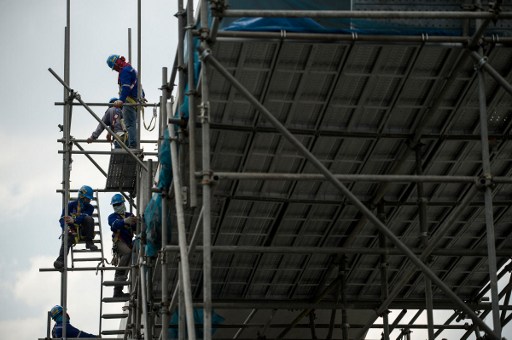
Workers are seen on scaffolding at a construction site for an expressway in Manila on March 8, 2017. AFP PHOTO
The Duterte administration’s infrastructure push continues to be hampered by bureaucratic bottlenecks, as shown by the Department of Public Works and Highways’ use of only a third of its P662.69-billion funding in 2017.
Even as the DPWH vastly improved its ability to earmark its budget for various purposes, the Commission on Audit found a slight decline in the agency’s actual spending of the funds.
In its 2017 annual audit report, the COA said only P222.66 billion, or 33.6 percent, of the DPWH’s allotment was disbursed “due to the delayed/non-implementation of infrastructure projects.”
The year 2017 saw a slight dip from the disbursement rates of 34.14 percent (P185.12 billion of P542.23 billion) and 34.03 percent (P148.23 billion of P435.58 billion) in 2016 and 2015.
The utilization of funds declined despite the DPWH incurring more obligations—or contracts, expenditures and other legal liabilities that the government would need to pay for—in 2017.
The DPWH managed to obligate P610.93 billion, or 92.19 percent of the P662.69-billion cleared by the Department of Budget and Management in 2017.
This was a huge improvement compared to the obligation rates of 77.32 percent (P419.28 billion of P542.23 billion) and 78 percent (P33.975 billion of P435.58 billion) notched in the years 2016 and 2015.
For state auditors, this showed the DPWH management “was not able to effectively manage the increasing amount of funds entrusted to the agency due to low physical delivery of target project and activities.”
Delayed completion
The DPWH’s inability to make use of its available funds was partly blamed on the delays or even the failure to implement thousands of infrastructure projects in 2017.
A total of 2,334 projects worth P62.59 billion were not completed within the specified contract time. One hudred twenty of these projects, costing P6.67 billion, incurred negative slippage (or the rate of delay) of 15 percent, but the DPWH had not imposed damages on the erring contractors or rescinded the contracts.
Meanwhile, 135 projects worth P6.07 billion were suspended, 15 worth P2.1 billion were terminated, and 815 worth P2.58 billion were not implemented at all.
Affected projects in 2017 include flood control projects, school buildings, farm-to-market roads, and various road infrastructure.
Recurring causes of delay include the delayed approval of proposed sites or the late issuance of permits by the local government units, lack of manpower, unfavorable weather conditions, difficulties in acquiring or transporting construction materials, right of way issues, and inadequate planning.
The delayed implementation of the projects “exposed [the DPWH] to risks of increased project costs and unenforceable All Risk Insurance,” auditors said.
The delays also meant “the funds allotted and obligated for the abovementioned projects were unnecessarily kept idle and undisbursed for a longer period of time.”
There’s also a domino effect as intended beneficiaries were deprived of the projects’ immediate use and other government agencies could not deliver basic social services due to the absence of infrastructure.
Commitment fees
The project delays also caused the government to incur P27.65 million in commitment fees, which were paid to the foreign lenders in exchange for their agreement to postpone the grant of a loan.
A total of P24.94 million in commitment fees had to be paid to the Japan International Cooperation Agency because of the delays in the Central Luzon Link Expressway Project, the Arterial Road Bypass Project II, the Pasig-Marikina River Channel Improvement Project Phase II, the Flood Risk Management Projects for the Cagayan, Tagolaon and Imus Rivers, and 84 road upgrading projects.
Another P2.7 million was paid last year to the Asian Development Bank because of the delays in 13 road improvement projects.
The abovementioned projects were delayed by the low disbursement of loan proceeds, averaging 15.45 percent (P762.7 million of P4.84 billion).
This was caused by the nonaccomplishment of target activities due to unfavorable weather, delayed relocation of informal settlers, change of plans, and the late issuance of local government permits.

